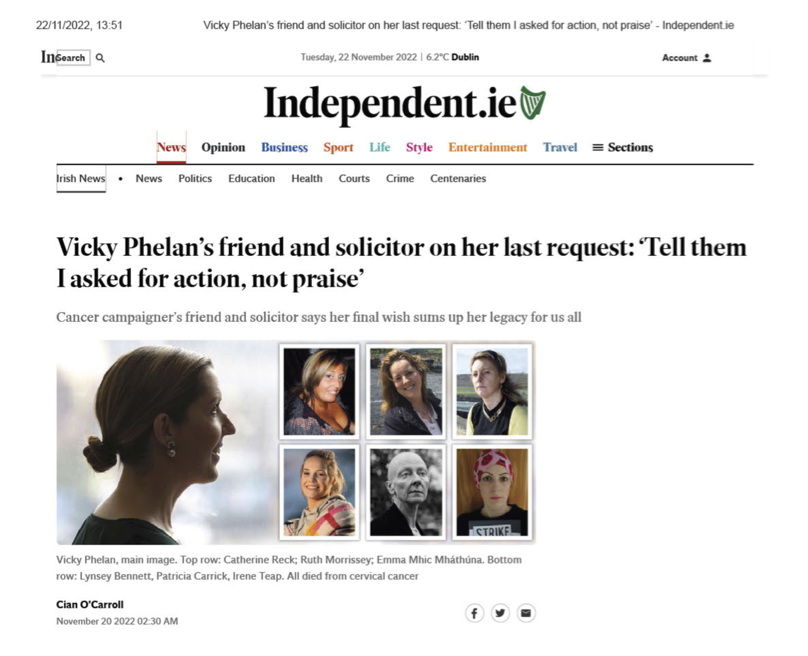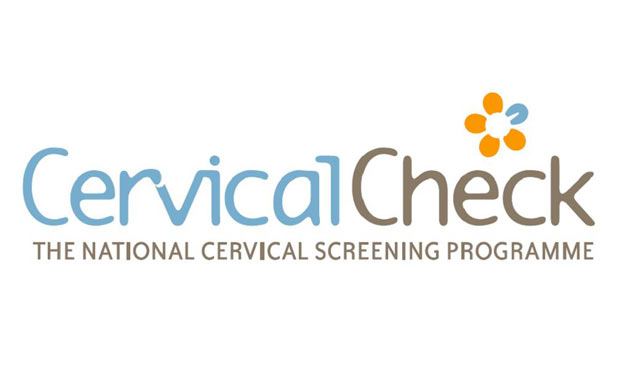With good reason, much has been said about Vicky Phelan's legacy. Her family life carries the legacy of her love, most obviously through the thoughtful and accomplished children she and Jim have nurtured, but also in the woven fabric of family and friends that came together to celebrate her life last week in Limerick; each person presents made better by having known Vicky; many now deeply marked by grief following her death.
May they all heal in time and find some solace in the beautiful gift that was her life - a life that in recent years Vicky unexpectedly had to share with all of us as she created, through pure altruism, a more public legacy. That public legacy came about. as everyone knows. because she felt compelled to turn her personal calamity of a misdiagnosed and then incurable cervical cancer into an opportunity to improve the livesand welfare of all those around her. A real and relatable person. Added to that softness, Vicky had natural political and media skills and quickly figured out how to use those to attack the cancer of complacency, self-congratulation and of paternalism in our health system. She could be, to use the words of Mary Robinson, "a sophisticated bad girl".
May they all heal in time and find some solace in the beautiful gift that was her life - a life that in recent years Vicky unexpectedly had to share with all of us as she created, through pure altruism, a more public legacy. That public legacy came about. as everyone knows. because she felt compelled to turn her personal calamity of a misdiagnosed and then incurable cervical cancer into an opportunity to improve the livesand welfare of all those around her. A real and relatable person. Added to that softness, Vicky had natural political and media skills and quickly figured out how to use those to attack the cancer of complacency, self-congratulation and of paternalism in our health system. She could be, to use the words of Mary Robinson, "a sophisticated bad girl".
1. Be Honest
Let's stop this spin that what happened at CervicalCheck was only about "non-disclosure". Truth and honesty mattered to Vicky. Her actions were guided by these values. She did not appreciate the phrase "the CervicalCheck non-disclosure debacle" used by some last week to describe what she uncovered. This phrase encapsulates a view that what happened in CervicalCheck had nothing to do with the actual screening, that the High Court and Supreme Court got it wrong in Ruth Morrissey's case and that "discordances", as they like to call the often-negligent misreading of smear tests, were not "patient safety incidents" and therefore did not and do not carry any obligation on doctors to give that information to the patient.
Vicky Phelan didn't die from non-disclosure. Neither did her friend Ruth Morrissey, Emma Mhic Mhathúna, Patricia Carrick, Lynsey Bennett the many others we know of- or perhaps don't.
Vicky and all those other women died or were brutally injured because in 2007 and 2008, the HSE, against its own expert medical advice, decided to save
money by outsourcing cervical screening to mostly foreign, for-profit laboratories. Ireland became the first and only country to outsource its cervical
screening programme abroad, and in doing so the HSE failed to effect any meaningful quality assurance oversight. As acknowledged by Dr Gabriel Scally, such management was "non-existent". Those laboratories were chosen through a tendering process for the purpose of saving money. It was"screening on the cheap" and it was pushed through in 2007 and 2008 when Ireland was riding high on the hog and had no need to do anything on the cheap.
The result was not only predictable but had actually been predicted. In 2008, consultant pathologist Dr David Gibbons noted that Irish labs were picking up high-grade pre-cancerous features in about 1.8% of the smears they examined. The US laboratory was only detecting these in 1.2% of smears. He voiced his serious concerns and predicted that in 10 years, many lives would be lost as a result of this outsourcing, but those concerns fell on deaf ears and, ultimately, he resigned in protest as chair of the cytology/histology group within the quality assurance committee of the National Cervical Screening Programme. Seven others resigned with him.
Vicky Phelan didn't die from non-disclosure. Neither did her friend Ruth Morrissey, Emma Mhic Mhathúna, Patricia Carrick, Lynsey Bennett the many others we know of- or perhaps don't.
Vicky and all those other women died or were brutally injured because in 2007 and 2008, the HSE, against its own expert medical advice, decided to save
money by outsourcing cervical screening to mostly foreign, for-profit laboratories. Ireland became the first and only country to outsource its cervical
screening programme abroad, and in doing so the HSE failed to effect any meaningful quality assurance oversight. As acknowledged by Dr Gabriel Scally, such management was "non-existent". Those laboratories were chosen through a tendering process for the purpose of saving money. It was"screening on the cheap" and it was pushed through in 2007 and 2008 when Ireland was riding high on the hog and had no need to do anything on the cheap.
The result was not only predictable but had actually been predicted. In 2008, consultant pathologist Dr David Gibbons noted that Irish labs were picking up high-grade pre-cancerous features in about 1.8% of the smears they examined. The US laboratory was only detecting these in 1.2% of smears. He voiced his serious concerns and predicted that in 10 years, many lives would be lost as a result of this outsourcing, but those concerns fell on deaf ears and, ultimately, he resigned in protest as chair of the cytology/histology group within the quality assurance committee of the National Cervical Screening Programme. Seven others resigned with him.
2. "Bring screening home"

Outsourcing was unnecessary and a huge mistake and it led to the disaster that CervicalCheck has been for hundreds of Irish women and their families and it needs to be reversed. Vicky said "bring screening home" and that is precisely what must be done.
Simon Harris, the health minister with whom Vicky worked closely and respected, gave a sincere commitment in 2019 to do so and a new laboratory has been built at the Coombe Hospital in Dublin. It needs to be commissioned and staffed without delay. Worryingly, Micheal Martin said last week that the HSE planned to continue to outsource at least some of Ireland's cervical screening abroad. This is not acceptable.
All women must be treated equally with the same levelof quality assurance and oversight applying to everyone's smear test. That cannot happen if some slides are being screened in a state laboratory in Dublin and others in a private laboratory several time zones away with no direct oversight or inspector on-site.
On that point, it is notable that since CervicalCheck was launched in 2008, The Coombe has been the only publicly funded, not-for-profit laboratory to be a part of the screening programme.
It has had at least 10% of all Irish screenings since then, yet it has barely featured in any of the hundreds of legal cases that have come before the courts.
"Bring screening home." - Vicky Phelan, CervicalCheck campaigner.
3. Restart the CervicalCheck audit
| The next legacy issue for Vicky is the CervicalCheck Cancer Audit Review must be restarted. It used to be the case that when a woman developed cancer, CervicalCheck required labs to review past smear tests to check if something had been learning if there had been a similar failure in their screening. The HSE said it wanted to figure out how best to communicate the results of the audit to women. Yet, almost five years later it still can not figure it out, and the approximately 1,500 women who have been diagnosed with cervical cancer since have all been kept in the dark about whether their previous smear history was also negligently misread like Vicky's. This is the very opposite of open disclosure. This is deliberate and calculated secrecy - a conscious denial of a woman's right to know the truth about her own medical history. This is precisely what the current Tánaiste extended a powerful state apology for in 2019, yet the withholding of important medical information goes on. Without an audit, there is a denial of a woman’s right of access to her own medical record, but there is also an alarming lapse of quality assurance if cancers that are detected following normal smear tests are not being investigated in any way to see if improvements need to be made. Surely we have learned by now that blind faith in far-flung private laboratories is not a good idea. |
4. Open disclosure now
The Patient Safety Bill of 2019 must be enacted urgently. It is a similar issue to the Cancer Audit Review, but much broader in its scope for all health service users. This legislation was drafted in the wake of Vicky's case and the CervicalCheck scandal because it became clear existing guidelines and legislation on open disclosure were not effective, each containing loopholes allowing doctors to decide how much a patient should be told about their own treatment, their own bodies.
In the Dail last week, Mary Lou McDonald pressed the Taoiseach to progress this legislation urgently. With cross-party support, an undiluted law prohibiting doctors from deciding how much information a patient has to be told is within reach. The Taoiseach and his coalition colleagues seem to be supportive of the legislation, and Sinn Fein's proposed deadline to get the job done by year end, appropriately ambitious, would certainly be a fitting tribute to Vicky.
In the Dail last week, Mary Lou McDonald pressed the Taoiseach to progress this legislation urgently. With cross-party support, an undiluted law prohibiting doctors from deciding how much information a patient has to be told is within reach. The Taoiseach and his coalition colleagues seem to be supportive of the legislation, and Sinn Fein's proposed deadline to get the job done by year end, appropriately ambitious, would certainly be a fitting tribute to Vicky.
5. The Civil Liability Act
One consequence of the Supreme Court decision in the landmark CervicalCheck case brought by the late Ruth Morrissey requires urgent legislative attention.
Before that case, when a person suffered a fatal injury and they brought legal proceedings in their lifetime, it was the practice that all loss and harm was addressed by the court in a single case. Such cases will see the injured party (usually following a cancer misdiagnosis setting out a case for damages for their pain and suffering, loss of life, loss of earnings and necessary additional care costs. If they have children, they would also seek the notional cost to care for those children in the absence of that parent and sometimes that might be very substantial where a child or children had additional or special needs. In my experience, the person dying derived significant comfort from
That all changed in 2020. MedlabPathology, one of the laboratories found to have committed medical negligence by misreading two of Ruth Morrissey's smears, successfully argued in the Supreme Court that this future loss in respect of the children could only arise on the actual death of the parent and that those losses could not form part of the current case.
The problem, however, is that Section 48(2) of the Civil Liability Act 1961 says only one case can be brought in respect to wrongful death. This means that if those children seek damages for their own care following the death of the parent, they would very likely be met by the argument that their case is not permitted in law.
For this reason, several parents facing death in the last two years have had to make a cruel choice: to forgo any damages for their own pain, suffering, loss of life and end-of-life care in order to be sure their children will not be barred from taking a case for their own care after the parent dies. This parent, dying through the medical negligence of another, is now denied damages for their own loss and denied the comfort of knowing that their children are provided for.
The Supreme Court has acknowledged this is a matter for the legislature. Labour presented amending legislation to the Government last year, but urgent action is required. Amending the Civil Liability Act to ensure the protection of these children should be a legislative priority. The issue arose after Vicky's case but she was well aware of it and came to know about families affected by it.
There are many other issues on Vicky's to-do list, all of them practical, reasonable steps to improve healthcare and the society we live in. She told me some months ago that when this day came and her name was on every politician's lips, I was to remind them what she asked for was action, not praise. In fairness, Vicky Phelan has earned both.
Cian O’Carroll is a solicitor who acted for Vicky Phelan, as well as many other women impacted by CervicalCheck
Before that case, when a person suffered a fatal injury and they brought legal proceedings in their lifetime, it was the practice that all loss and harm was addressed by the court in a single case. Such cases will see the injured party (usually following a cancer misdiagnosis setting out a case for damages for their pain and suffering, loss of life, loss of earnings and necessary additional care costs. If they have children, they would also seek the notional cost to care for those children in the absence of that parent and sometimes that might be very substantial where a child or children had additional or special needs. In my experience, the person dying derived significant comfort from
That all changed in 2020. MedlabPathology, one of the laboratories found to have committed medical negligence by misreading two of Ruth Morrissey's smears, successfully argued in the Supreme Court that this future loss in respect of the children could only arise on the actual death of the parent and that those losses could not form part of the current case.
The problem, however, is that Section 48(2) of the Civil Liability Act 1961 says only one case can be brought in respect to wrongful death. This means that if those children seek damages for their own care following the death of the parent, they would very likely be met by the argument that their case is not permitted in law.
For this reason, several parents facing death in the last two years have had to make a cruel choice: to forgo any damages for their own pain, suffering, loss of life and end-of-life care in order to be sure their children will not be barred from taking a case for their own care after the parent dies. This parent, dying through the medical negligence of another, is now denied damages for their own loss and denied the comfort of knowing that their children are provided for.
The Supreme Court has acknowledged this is a matter for the legislature. Labour presented amending legislation to the Government last year, but urgent action is required. Amending the Civil Liability Act to ensure the protection of these children should be a legislative priority. The issue arose after Vicky's case but she was well aware of it and came to know about families affected by it.
There are many other issues on Vicky's to-do list, all of them practical, reasonable steps to improve healthcare and the society we live in. She told me some months ago that when this day came and her name was on every politician's lips, I was to remind them what she asked for was action, not praise. In fairness, Vicky Phelan has earned both.
Cian O’Carroll is a solicitor who acted for Vicky Phelan, as well as many other women impacted by CervicalCheck



 RSS Feed
RSS Feed



